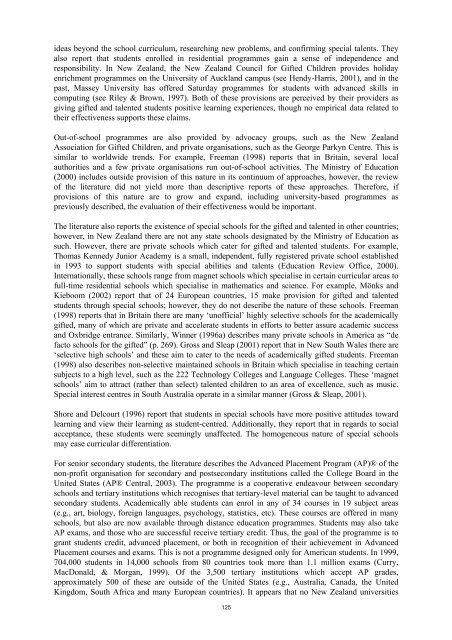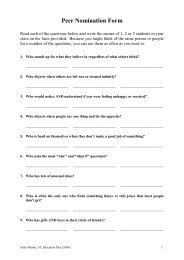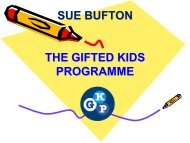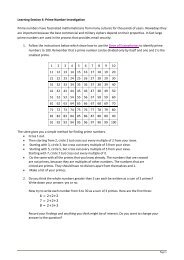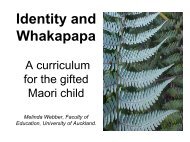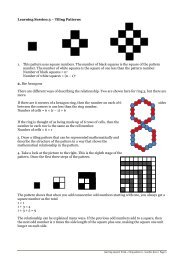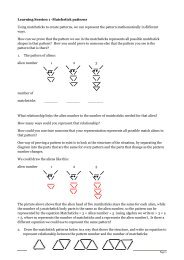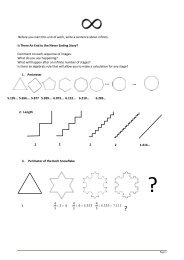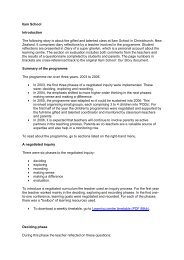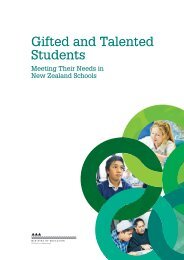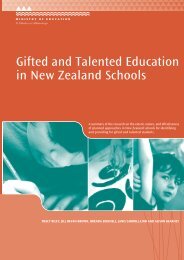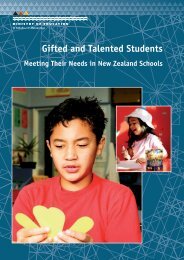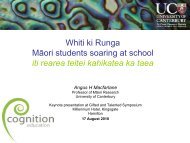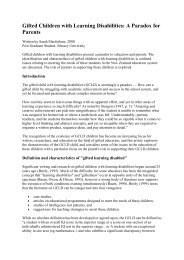The Extent, Nature and Effectiveness of Planned Approaches in ...
The Extent, Nature and Effectiveness of Planned Approaches in ...
The Extent, Nature and Effectiveness of Planned Approaches in ...
Create successful ePaper yourself
Turn your PDF publications into a flip-book with our unique Google optimized e-Paper software.
ideas beyond the school curriculum, research<strong>in</strong>g new problems, <strong>and</strong> confirm<strong>in</strong>g special talents. <strong>The</strong>yalso report that students enrolled <strong>in</strong> residential programmes ga<strong>in</strong> a sense <strong>of</strong> <strong>in</strong>dependence <strong>and</strong>responsibility. In New Zeal<strong>and</strong>, the New Zeal<strong>and</strong> Council for Gifted Children provides holidayenrichment programmes on the University <strong>of</strong> Auckl<strong>and</strong> campus (see Hendy-Harris, 2001), <strong>and</strong> <strong>in</strong> thepast, Massey University has <strong>of</strong>fered Saturday programmes for students with advanced skills <strong>in</strong>comput<strong>in</strong>g (see Riley & Brown, 1997). Both <strong>of</strong> these provisions are perceived by their providers asgiv<strong>in</strong>g gifted <strong>and</strong> talented students positive learn<strong>in</strong>g experiences, though no empirical data related totheir effectiveness supports these claims.Out-<strong>of</strong>-school programmes are also provided by advocacy groups, such as the New Zeal<strong>and</strong>Association for Gifted Children, <strong>and</strong> private organisations, such as the George Parkyn Centre. This issimilar to worldwide trends. For example, Freeman (1998) reports that <strong>in</strong> Brita<strong>in</strong>, several localauthorities <strong>and</strong> a few private organisations run out-<strong>of</strong>-school activities. <strong>The</strong> M<strong>in</strong>istry <strong>of</strong> Education(2000) <strong>in</strong>cludes outside provision <strong>of</strong> this nature <strong>in</strong> its cont<strong>in</strong>uum <strong>of</strong> approaches, however, the review<strong>of</strong> the literature did not yield more than descriptive reports <strong>of</strong> these approaches. <strong>The</strong>refore, ifprovisions <strong>of</strong> this nature are to grow <strong>and</strong> exp<strong>and</strong>, <strong>in</strong>clud<strong>in</strong>g university-based programmes aspreviously described, the evaluation <strong>of</strong> their effectiveness would be important.<strong>The</strong> literature also reports the existence <strong>of</strong> special schools for the gifted <strong>and</strong> talented <strong>in</strong> other countries;however, <strong>in</strong> New Zeal<strong>and</strong> there are not any state schools designated by the M<strong>in</strong>istry <strong>of</strong> Education assuch. However, there are private schools which cater for gifted <strong>and</strong> talented students. For example,Thomas Kennedy Junior Academy is a small, <strong>in</strong>dependent, fully registered private school established<strong>in</strong> 1993 to support students with special abilities <strong>and</strong> talents (Education Review Office, 2000).Internationally, these schools range from magnet schools which specialise <strong>in</strong> certa<strong>in</strong> curricular areas t<strong>of</strong>ull-time residential schools which specialise <strong>in</strong> mathematics <strong>and</strong> science. For example, Mönks <strong>and</strong>Kieboom (2002) report that <strong>of</strong> 24 European countries, 15 make provision for gifted <strong>and</strong> talentedstudents through special schools; however, they do not describe the nature <strong>of</strong> these schools. Freeman(1998) reports that <strong>in</strong> Brita<strong>in</strong> there are many ‘un<strong>of</strong>ficial’ highly selective schools for the academicallygifted, many <strong>of</strong> which are private <strong>and</strong> accelerate students <strong>in</strong> efforts to better assure academic success<strong>and</strong> Oxbridge entrance. Similarly, W<strong>in</strong>ner (1996a) describes many private schools <strong>in</strong> America as “defacto schools for the gifted” (p. 269). Gross <strong>and</strong> Sleap (2001) report that <strong>in</strong> New South Wales there are‘selective high schools’ <strong>and</strong> these aim to cater to the needs <strong>of</strong> academically gifted students. Freeman(1998) also describes non-selective ma<strong>in</strong>ta<strong>in</strong>ed schools <strong>in</strong> Brita<strong>in</strong> which specialise <strong>in</strong> teach<strong>in</strong>g certa<strong>in</strong>subjects to a high level, such as the 222 Technology Colleges <strong>and</strong> Language Colleges. <strong>The</strong>se ‘magnetschools’ aim to attract (rather than select) talented children to an area <strong>of</strong> excellence, such as music.Special <strong>in</strong>terest centres <strong>in</strong> South Australia operate <strong>in</strong> a similar manner (Gross & Sleap, 2001).Shore <strong>and</strong> Delcourt (1996) report that students <strong>in</strong> special schools have more positive attitudes towardlearn<strong>in</strong>g <strong>and</strong> view their learn<strong>in</strong>g as student-centred. Additionally, they report that <strong>in</strong> regards to socialacceptance, these students were seem<strong>in</strong>gly unaffected. <strong>The</strong> homogeneous nature <strong>of</strong> special schoolsmay ease curricular differentiation.For senior secondary students, the literature describes the Advanced Placement Program (AP)® <strong>of</strong> thenon-pr<strong>of</strong>it organisation for secondary <strong>and</strong> postsecondary <strong>in</strong>stitutions called the College Board <strong>in</strong> theUnited States (AP® Central, 2003). <strong>The</strong> programme is a cooperative endeavour between secondaryschools <strong>and</strong> tertiary <strong>in</strong>stitutions which recognises that tertiary-level material can be taught to advancedsecondary students. Academically able students can enrol <strong>in</strong> any <strong>of</strong> 34 courses <strong>in</strong> 19 subject areas(e.g., art, biology, foreign languages, psychology, statistics, etc). <strong>The</strong>se courses are <strong>of</strong>fered <strong>in</strong> manyschools, but also are now available through distance education programmes. Students may also takeAP exams, <strong>and</strong> those who are successful receive tertiary credit. Thus, the goal <strong>of</strong> the programme is togrant students credit, advanced placement, or both <strong>in</strong> recognition <strong>of</strong> their achievement <strong>in</strong> AdvancedPlacement courses <strong>and</strong> exams. This is not a programme designed only for American students. In 1999,704,000 students <strong>in</strong> 14,000 schools from 80 countries took more than 1.1 million exams (Curry,MacDonald, & Morgan, 1999). Of the 3,500 tertiary <strong>in</strong>stitutions which accept AP grades,approximately 500 <strong>of</strong> these are outside <strong>of</strong> the United States (e.g., Australia, Canada, the UnitedK<strong>in</strong>gdom, South Africa <strong>and</strong> many European countries). It appears that no New Zeal<strong>and</strong> universities125


